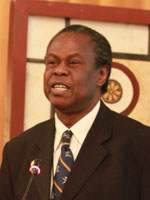Q and A with Dr Francis G Omaswa, MBChB, MMed, FRCS, MEPI Coordinating Center PI
January / February 2013 | Volume 12, Issue 1

Dr. Francis G. Omaswa
Dr. Francis G. Omaswa is a principal investigator for the Medical Education Partnership Initiative (MEPI) Coordinating Center and directs the participating institution, the African Center for Global Health and Social Transformation (ACHEST), a think tank promoted by a network of African and international leaders in health and development. Previously, Omaswa was founding director of the Global Health Workforce Alliance and director general for Health Services in Uganda's Ministry of Health.
What's your vision for the Medical Education Partnership Initiative (MEPI)?
A successful MEPI will lead to a big shift in paradigm inside each of the countries where the grantee schools are located, linking medical education and better health outcomes of the population. Grantee countries will continue getting together various stakeholders in their countries to create and implement health workforce plans. These plans will be linked to national development plans, addressing inequalities in the different segments of the population and achieving better health outcomes.
Why is this effort so important right now?
The timing is great. According to the World Bank, eight of the world's 10 fastest growing economies are in Africa. There is more social and political stability. There are still wars, but compared with 20 years ago when we had military dictators as the norm, it is different. There is a stronger civil society movement for social justice, globally and also in our countries. In many of the elections, the health agenda of candidates is important; they get asked about health and they do make promises. The next move is to hold them accountable to those promises. So Africa is positive right now and it's a great environment in which MEPI can play a vital role.
What catalyst has MEPI provided?
When we go to visit the grantee schools, [officials there] comment that the grant has breathed new life into their school. Although the funding amount is not huge, they became committed in writing their grant applications, reflecting on what they would do with support, how they could increase their capacity to train, engage in locally relevant research, retain graduates and look at sustainability.
We need to engage with African advocacy groups, civil society advocacy groups, because they are really now quite significant. Every country has a couple. Recently in Uganda, they persuaded parliament not to pass the budget until the government had put more money to recruit rural health workers. The government increased the budget and also offered to pitch the salaries of doctors in rural areas - where most of the people are - higher than for the doctors who work in town. Civil society did that. So if we persist with these communications, engage at high levels the involvement of civil society and of professional associations, the objective of better motivated health workers will become a reality.
What's the role of research and research training in MEPI?
One of the historical weaknesses of African health systems' performance is incorporating research evidence into policies. So it was very important to put that as a key goal of MEPI. Until we get into the habit of using research as the foundation of our policies and as a way to improve our performance, then our resources will be poorly applied and we will not be getting the right results. We also need basic science research to answer questions, for example, about the immunology of malaria and now we're going into genomics.
What are you most proud of so far?
What lifts my own spirits is going to the schools and hearing their leaders, vice chancellors, deans, tell me that because of MEPI they have been able to do what was not possible before, for example, more connectivity with the Internet, students using the library and laptops more, setting up research support centers and recruiting new faculty. Before MEPI, it was not happening. It was just frustration and saying 'I wish, I wish I could.' Now it's 'Yes I can!'
What would you like to see in 10, 20 years?
The priorities are more doctors, better doctors who are staying in the countries, particularly where the communities are, doctors who understand the potential of research and are using research evidence in their routine work. It's a priority for governments and populations to absorb and own the message of MEPI. We also need international linkages so we are not an island; we are in one world, in tandem with our partners.
More Information
To view Adobe PDF files,
download current, free accessible plug-ins from Adobe's website.